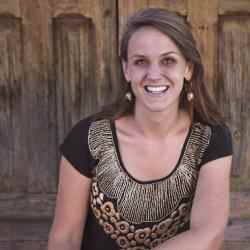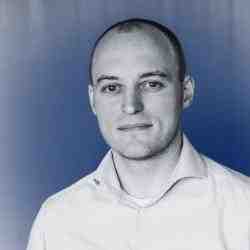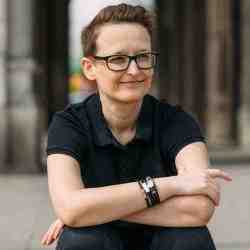Introducción
Hospitals really are in a critical situation in France, with ever increasing budget cuts, impacting health professionals and thus patients. Nolwenn pioneers a new structure in which health professionals can improve their work conditions and quality of patient care while being cost-efficient.
La idea nueva
Nolwenn believes health professionals are key to opening patients-centric care initiatives that they design and launch. Given the right resources and support structures, they can conceptualize and lead initiatives within the hospital that not only cut costs but deliver better care.
Nolwenn is further strengthening the shift to patients-centric practice by attaching it to another improved practice in the hospital, recycling previously unexploited biomedical waste. She gathers all the staff, from doctors to nurses to stretcher bearers, around this ecological initiative that builds pride and enthusiasm but is also a revenue stream for her non-profit organization, “Les P’tits Doudous”. For the first time in public health, instead of being designed and imposed by the administration, change is happening from within by all spectrum: internal staff, internal resources, internal innovative projects.
Having demonstrated the feasibility and impact of opening change-making opportunities to all health professionals, Nolwenn is structuring the organizational framework for caregivers teams to form and expand their capacities, to identify real and widely shared needs and to spread proven solutions within their own medical centers. Today, thanks to the first solutions developed by her growing network of 40 teams, in public then private health centers, Nolwenn is already impacting 50,000 children and their families each year, while also improving working conditions for health professionals, saving costs for hospitals and indirectly impacting the environment.
El problema
French public hospitals have been cutting costs for years (minus € 1.1 billion in 2017 and 1.6 billion in 2018), limiting workforce and resources. Hospitals are pyramid-shaped and the staff work in silos, leading to a lack of internal communication across services. The administrative processes are not designed to elicit solutions from the people who directly observe patients’ needs. Widespread distress translates into high turnover rates and 40% of health professionals in France burn out at some point in their career. Nurses generally chose this job for its humane purpose but after 5 to 10 years under pressure, many choose to quit. Loss of purpose leads to disengagement of teams and individuals.
Health professionals working in hospitals are limited to their operational role, while health policies and innovations are being strategically defined by political committees sitting directors and researchers. Caregivers lack time, resources and opportunities to become change-makers.
Health research and development focus on technical innovation and new equipment rather than patients’ care. Health professionals are still trained to top-down approaches in which patients are considered as care recipients, instead of learning how to deliver sensitive and empowering care beyond strictly medical dimensions of the hospital experience. Patients are not equipped with the knowledge and capacity to deal with their own care. They need more relational care time but caregivers are overworked.
Yet, there is a momentum for change, as the European Commission is encouraging the use of new technologies within hospitals to foster responsible structural innovation and decompartmentalization of services and functions, in order to reconnect needs and solutions and improve the quality of care.
La estrategia
Nolwenn successfully proved that empowering health professionals is a lever for change that every stakeholder will gain from. Seeing how powerless most her colleagues felt, she realized that the present system contributed to widespread distress and burnout. Building on her initial experience of engaging a team of nurses within the hospital to develop concrete new care solutions, such as a digital application to reduce children’s anxiety before surgery, she identified the key elements any health professional would need to launch his/her own initiative: a core team of motivated staff with an “I can” mindset, a locally registered organization and a sustainable revenue stream to be able to act independently, a recognized identity bringing credibility and facilitating support, and administrative support to ease the whole process. To establish a sustainable revenue stream, Nolwenn taped into an overlooked opportunity in recycling a certain type of non-contaminated hospital waste, such as copper scalpel cables that are usually disposed of at high costs like all potentially contaminated biomedical waste. In addition to sustain local activities, this recycling process is also an opportunity to bring hospital teams together around an environment-friendly action. As for the shared and recognized identity, Nolwenn developed the national brand “Les P’tits Doudous” under which local teams can independently organize. What is more, Nolwenn’s positive and empowering posture is a real shift, giving nurses confidence to launch impactful projects to address local patients’ needs.
To transfer these key elements to other teams of professionals in other health centers, Nolwenn designed a framework of values and tools including general advice, the recycling protocol, a chart to ensure a quality control, the brand (name, logo), document templates and administrative support to register a separate local organization, as well as 2 tablets displaying the digital application she created so that they can quickly implement a first impactful action.
Equipped with this carefully crafted free toolkit, already 40 local chapters emerged across France (Lyon, Montpellier, French Polynesia, Lille, Nancy, Paris, New-Caledonia...), independent but united under the national brand “Les P’tits Doudous”, to replicate the initiative Nolwenn initially led in the public University Hospital in Rennes. This represents about 300 volunteering health professionals who are actively designing and implementing a range of projects, from small local initiatives such as a toy car to take younger children to the operation theatre in a playful atmosphere, to bigger projects such as implementing the use of digital applications to decrease the patient’s anxiety. Nolwenn’s first digital application is a "serious" game that engages children in the fun of playing in order to lower their anxiety level and accompany their hospital pathway before surgery. It was implemented by each and every local team: it is now lowering the pre-surgery anxiety of 50,000 children a year, reducing the length of hospital stay and decreasing post-surgery pain, sleep disorders and drugs intake. Furthermore, it impacted the hospital practice in Rennes and in a growing number of other hospitals: seeing the impact of this new practice, doctors now systematically prescribe the use of the application in replacement of all other premedication. Anticipating impact measurement, Nolwenn directly included data collecting mechanisms in her app so that both health professionals and children from any hospital could provide inputs regularly in order to continuously improve the solution. Beyond the impact on patients, Nolwenn’s initiative also addresses the issue of burnouts and ill-being of health professionals, with first qualitative testimonies showing an increased motivation and potential impact on the rate of sick leaves. Nolwenn is planning to further measure and analyze this impact by working with a psychology university. Finally, the recycling model widely adopted by local chapters positively impacts the environment by recycling tons of materials that were previously incinerated; and offers the additional benefit of avoiding costs for the hospital.
To further structure and enhance this growing decentralized network and its impact, Nolwenn now steps into a national coordination role. To do so, she structured a “mother” national non-profit organization whose role is not only to support existing and future local chapters, ensure values consistency, but also to identify major shared needs across the network of teams, set up priorities and mobilise accordingly resources to develop and launch new projects answering these needs at national scale. The national coordination team also coordinate impact measurement. This mother structure is governed by health professionals representing all local chapters to ensure collective decision-making. Five national-scale projects are currently underway, including a pre-surgery visualization of the operating theatre through an augmented reality application for teenagers, or a software to expand and endorse the knowledge and expertise that patients acquire about their pathology during their hospital experience.
To fund the development of these projects, Nolwenn plans to leverage the power of her brand and digital apps. To do so, she created a sister commercial entity that allows her to manage the sale of “Les P’tits Doudous” by-products (teddy bears, bags, stickers, ...), ordered by local teams and patients, and the sale of her digital products to other interested organizations. For example, firefighters already expressed their professional interest for a real-time tracking application for family and professionals to follow the surgery process of patients. All benefits will be re-invested in the development of further projects, and the capital of this commercial entity is fully owned by the non-profit entity, thus ensuring control by health professionals on the long term. Looking to the future, Nolwenn also identified opportunities in partnering with national health insurance groups who see value in financing initiatives that decrease patient medications and/or increase caregivers’ wellbeing.
The ultimate pieces of Nolwenn’s national role are representation, advocacy and managing international development. Already featured in several media and publicly congratulated by the French President, Nolwenn has now started conversation with key public decision-makers and is leveraging her public and institutional visibility to advocate for a renewed health system in which nurses and all health professionals would have recognition and allocated time for contributing to care innovation. By sharing her experience in national and international health congress, Nolwenn also identified strong international development opportunities. She is currently discussing with health professionals from Canada, US, Europe, willing to replicate her solution. She also travelled to Jordan and used her digital application to overcome a language barrier.
La persona
Nolwenn’s brother underwent a complex surgical operation before she was born, it was a traumatic experience for the family. Nolwenn decided to train as a nursing auxiliary, then a nurse, then a nurse anesthetist. She was passionate about her job, but nursing careers are notoriously short and after 10 years working at Rennes University Hospital (France), she grew tired of listening to children cries and tears.
She considered leaving but instead she decided to make a change and bring comfort to children undergoing surgery. She reached out to and convinced a local company manufacturing teddy bears and convinced them to send some free stuffed toys to give to kids after surgery. Amazed by the impact of this simple action, she started to look for financial resources to sustain her action over a longer-term. She realized that tons of copper scalpel cables were disposed of at high costs like all potentially contaminated biomedical waste; and recycling them through scrap dealers would both save costs to the hospital and generate a revenue stream to fund her initiative and those of other health professionals, while engaging the latter around an exciting ecological action. She thus created a non-profit organization and mobilized a team of nurses and doctors to lead quick-win actions such as offering children stickers to customize their oxygen masks or small teddy bears (called “Doudous” in France). Willing to go further in reducing children’s anxiety, she looked for a digital application to channel children’s focus during their hospital experience, but it did not exist. She wasn’t discouraged and combined her team’s field experience and a developing company’s expertise to create a digital application named “You’re the hero”, describing the complete operating pathway and representing all services and staff the children would encounter during their hospital experience. She thus created links between professionals and engaged them in a common and ever-improving project, deeply impacting children’s care.
Fully driven by impact, Nolwenn then started to spread her innovation by supporting other caregivers in other hospitals to implement the changes she had already led with her team in Rennes and adapt her methodology to new projects for new targets in new hospital services. She led large crowdfunding campaign and successfully raised her goal of € 80,000 whereas she had been advised to rather set up a goal of € 20,000 at best. In 2018, she won a prominent national award from “La France S’Engage” Foundation which distinguishes, finances and supports the most innovative nation-wide social initiatives. Nolwenn now stands at a turning point: first focused on transforming the hospital experience for the children, she soon realized her idea greatly impacted health professionals as well, so she set up for re-inventing her own profession.

 Tile image
Tile image


